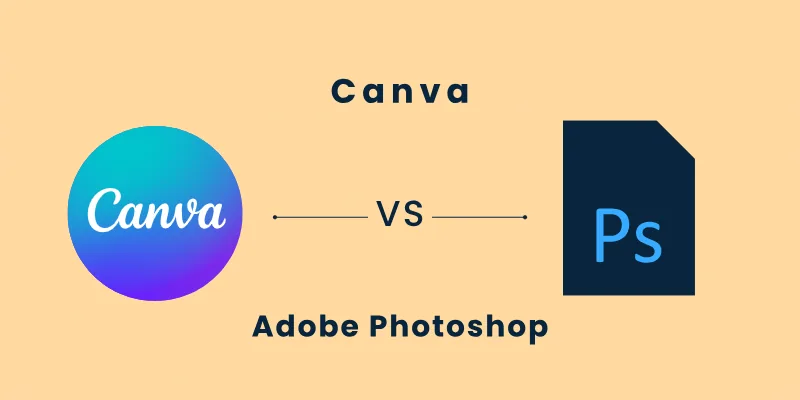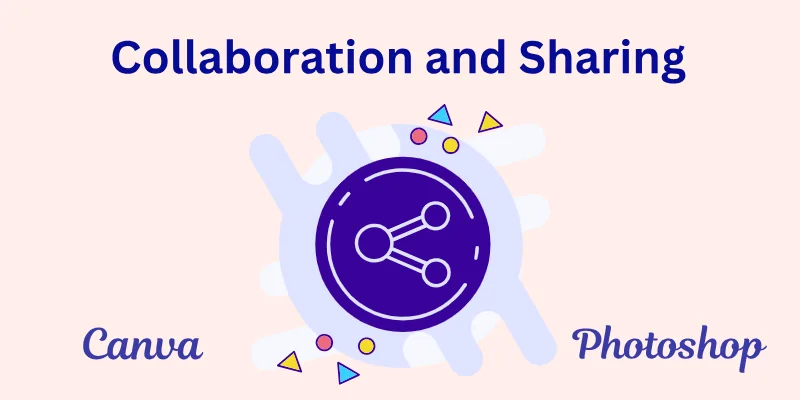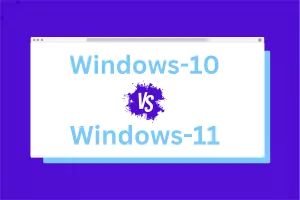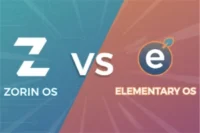Adobe Photoshop vs Canva: Comparison Guide
Published: 17 Oct 2024
Graphic design has become an important part of various industries, and having access to powerful design tools is important. Adobe Photoshop and Canva are two popular design platforms that offer different features and capabilities.
In this article, we will find into the details and explore the differences between Adobe Photoshop and Canva, shedding light on their unique strengths and helping users make informed decisions based on their specific design needs.

Adobe Photoshop vs Canva: Key Comparison
Here is the list of differences between Adobe Photoshop and Canva:
- Functionality and Complexity
- Design and Capabilities
- Image Editing
- Vector Graphics
- Typography and Text Effects
- Customization and Flexibility
- Collaboration and Sharing
- Pricing and Accessibility
- Learning Curve
- Output Quality
- Use in Education and Business
Let’s discuss all the differences about Photoshop and Canva in details:
1. Functionality and Complexity:
Adobe Photoshop: Adobe Photoshop is a professional-grade software with a wide range of features and tools, offering unlimited flexibility and control over design elements.

Canva: Canva is a web-based design platform that serve more to beginners and non-designers, providing simplified tools and templates for quick and easy design creation.
2. Design Capabilities:
Adobe Photoshop: Adobe Photoshop is famous for its huge design capabilities, allowing users to create complex and complex designs with pixel-level clarity. It offers advanced features for image editing, retouching, compositing, and manipulating various design elements.
Canva: Canva, while not as comprehensive, excels in providing a user-friendly interface with pre-designed templates, making it ideal for creating social media graphics, presentations, and simple designs without need in-depth design knowledge.
3. Image Editing:
Adobe Photoshop: Adobe Photoshop is the industry standard for professional image editing. It offers powerful editing tools, such as layers, masks, and adjustment layers, enabling correct control over every point of an image.

Canva: Canva provides basic image editing capabilities, including resizing, cropping, and applying filters, suitable for quick edits and enhancements without the complexity of Photoshop.
4. Vector Graphics:
Adobe Photoshop: Adobe Photoshop primarily operates with raster graphics, which are composed of pixels and may lose quality when scaled.
Canva: Canva supports vector graphics, which are resolution-independent and can be scaled without losing quality. This makes Canva more suitable for creating logos, icons, and illustrations that require scalability.
5. Typography and Text Effects:
Adobe Photoshop: Both Adobe Photoshop and Canva offer a variety of typography options. Photoshop provides advanced text editing capabilities, including correct control over fonts, sizes, tracking, and text effects.
Canva: Canva simplifies text editing with pre-designed text styles, making it easy to create transparently appealing designs without great typography knowledge.
6. Customization and Flexibility:
Adobe Photoshop: Adobe Photoshop allows users to create designs from scratch and offers endless customization possibilities. It provides complete control over every design element, enabling users to create unique and personalized designs.
Canva: Canva, while offering customization options, is more focused on providing pre-designed templates that can be customized to suit single needs. It offers a wide range of ready-to-use design elements, making it an excellent choice for quick design creation.
7. Collaboration and Sharing:
Adobe Photoshop: Adobe Photoshop, while it offers collaboration options through cloud-based services like Adobe Creative Cloud, is not as smooth for real-time collaboration as Canva.

Canva: Canva excels in collaboration and sharing features, allowing multiple users to work on a design at the same time and share designs with team members or clients for feedback.
8. Pricing and Accessibility:
Adobe Photoshop: Adobe Photoshop is a premium software that requires a subscription to Adobe Creative Cloud, making it costlier for long-term use.
Canva: Canva offers a free trial model, providing a basic version for free and additional features through subscription plans. Canva’s web-based platform also makes it easily accessible from any device with an internet connection, whereas Photoshop requires installation on a specific device.
9. Learning Curve:
Adobe Photoshop: Adobe Photoshop has a costly learning curve due to its very big range of features and advanced capabilities. It requires time and effort to master the software and utilize its full potential.

Canva: Canva, with its user-friendly interface and simplified tools, has a shorter learning curve, allowing users to create designs quickly and easily, even with limited design experience.
10. Output Quality:
Adobe Photoshop: Professional-quality output suitable for both digital and print projects. Allows for high-resolution images with full control over image size and quality. Best choice for projects that require correct and high-quality pictures.
Canva: Suitable for digital use, such as social media posts or presentations. Can be used for printing but lacks the advanced control over resolution and quality. Best for everyday designs that don’t need professional-level quality.
11. Use in Education and Business:
Adobe Photoshop: Commonly used in design schools and by professionals in marketing, advertising, and photography. Provides the necessary tools for teaching graphic design at an advanced level. Businesses rely on Photoshop for branding, advertising, and product design.
Canva: Used in schools for teaching basic design and creativity. Ideal for small businesses or startups that need quick and simple marketing materials. Often used for creating presentations, social media graphics, and business cards.
Purpose of the Tools:
Here we discuss the purpose of both Tools:
Adobe Photoshop:
- Primarily used for advanced photo editing and graphic design.
- Known for its detailed features that allow professional work.
- Can handle complex projects like image manipulation, retouching, and digital painting.
- Ideal for users who need precise control over images.
Canva:
- Designed for quick and easy graphic creation.
- Used for simple projects like social media posts, presentations, and flyers.
- Best for users who don’t need advanced tools but want attractive designs.
- Perfect for non-designers who need fast results without much learning.
Conclusion:
Adobe Photoshop and Canva are both powerful design tools that cater to different user needs. Photoshop excels in providing extensive design capabilities, precise control, and professional-grade editing tools, making it ideal for graphic designers and those requiring complex designs.
Canva, with its simplified interface, pre-designed templates, and collaboration features, is more suited for beginners, non-designers, and those looking for quick and visually appealing designs.
Understanding the differences between Adobe Photoshop and Canva will help users choose the tool that aligns with their design requirements, skill level, and budget.
FAQs about Adobe Photoshop and Canva:
Here are some of the most FAQs related to Adobe Photoshop and Canva:
The main difference is in their complexity and target audience. Adobe Photoshop is a professional-grade software for detailed photo editing and graphic design, offering advanced tools and features.
Canva, on the other hand, is a beginner-friendly, web-based platform focused on quick, template-driven design projects with ease of use and simplicity.
Canva is generally better for beginners due to its intuitive drag-and-drop interface and pre-designed templates.
Adobe Photoshop has a steeper learning curve and is better suited for users with design experience or those looking for more advanced editing capabilities.
No, Canva cannot perform the same advanced tasks as Adobe Photoshop. Canva is more limited in functionality, focusing on quick designs, social media graphics, and simple editing.
Adobe Photoshop is generally better for professional use due to its powerful features and flexibility, allowing for highly detailed and custom designs.
Canva, while useful for quick and simple designs, is often considered less suitable for professional-grade work that requires advanced editing and customization.
Yes, Adobe Photoshop is more expensive than Canva. Adobe Photoshop is typically available through a subscription to Adobe Creative Cloud, which can be costly.
Canva offers a free version with basic features, and Canva Pro comes at a lower cost compared to Photoshop, making it a more budget-friendly option for casual users.
Yes, Photoshop has a mobile app, but it is not as feature-rich as the desktop version.
No, Photoshop can be used offline once installed.

- Be Respectful
- Stay Relevant
- Stay Positive
- True Feedback
- Encourage Discussion
- Avoid Spamming
- No Fake News
- Don't Copy-Paste
- No Personal Attacks

- Be Respectful
- Stay Relevant
- Stay Positive
- True Feedback
- Encourage Discussion
- Avoid Spamming
- No Fake News
- Don't Copy-Paste
- No Personal Attacks





